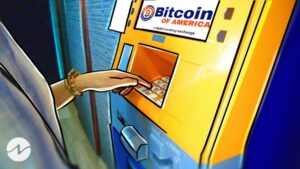
- Jorge Perez recently announced a settlement with Bitcoin of America.
- Bitcoin of America agreed to a consent order that make restitution totaling $86K.
Connecticut’s Banking Commissioner, Jorge Perez, recently announced a settlement with Bitcoin of America, a virtual currency kiosk operator. The Department of Banking had discovered that Bitcoin of America was operating these kiosks in Connecticut without the required license. However, leading to four consumers falling victim to scams and losing tens of thousands of dollars. Through a consent order, Bitcoin of America agreed to make restitution totaling $86,000 for the affected consumers. Moreover, this case serves as a reminder of the importance of caution when using virtual currency kiosks. And highlights the Department of Banking’s commitment to protecting consumers.
Bitcoin of America had been operating virtual currency kiosks in Connecticut without obtaining the necessary license. This is required for companies that engage in money transmission activities. These kiosks allow consumers to purchase virtual currency using cash. However, due to the lack of proper licensing, the kiosks facilitated scams that resulted in significant financial losses for unsuspecting consumers.
Moreso, the four Connecticut consumer who utilized Bitcoin of America’s virtual currency Kiosks became victims of scams orchestrated by fraudsters. In addition, these scammers impersonated legitimate companies, including banks and utility providers, to deceive consumers into depositing cash into the kiosks. The scammers provided QR codes to the consumers, who believed they were safeguarding their money. Unbeknownst to the consumers, the cash they deposited was converted into virtual currency. And sent to the scammers’ virtual wallets, resulting in the loss of their funds.
In addition, to address the harm caused to the affected consumers, Bitcoin of America agreed to a consent order that required them to make restitution totaling $86,000. Despite, this settlement aims to provide some relief to the victims and rectify the financial damage they suffered. Additionally, following a criminal indictment, Bitcoin of America has begun winding down its operations in Connecticut.
In response to the case and the growing problem of scams involving virtual currency kiosks, the Department of Banking and the Connecticut State Police have proposed a bill called HB 6752, titled “An Act Concerning Digital Assets.” Even more, this bill aims to grant the Banking Commissioner the authority to adopt regulations pertaining to virtual currency and other digital assets. It also explicitly mandates that virtual currency kiosks be licensed as money transmitters in the state, enabling the Commissioner to oversee these machines and their operators. The bill proposes the inclusion of clear consumer disclosures on the kiosk screens, which users must agree to, and introduces additional safeguards for first-time users of virtual currency kiosks.
Collaborative Efforts and Consumer Alerts:
To better assist consumers and prevent similar scams, the Department of Banking, in collaboration with the Connecticut State Police, the Office of the Attorney General, and the Department of Consumer Protection, has issued a consumer alert. This alert provides valuable tips and guidance to help individuals avoid becoming victims of scams associated with virtual currency kiosks. By raising awareness and providing information, the aim is to empower consumers and mitigate the risks associated with these fraudulent activities.
Furthermore, the settlement between the Connecticut Department of Banking and Bitcoin of America underscores the importance of proper licensing. And consumer protection measures in the realm of virtual currency. The restitution provided to the affected consumers serves as a step towards rectifying the financial harm they experienced. All-in-all, the proposed legislation and collaborative efforts demonstrate the state’s commitment to safeguarding consumers and regulating virtual currency kiosks. By staying vigilant, informed, and cautious, individuals can reduce their vulnerability to scams. And make informed decisions when engaging with virtual currencies and related services.














